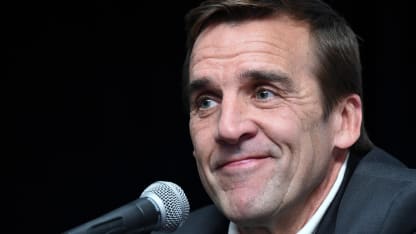George McPhee has work cut out for him in Las Vegas
Former expansion general managers know building team from scratch is no easy task

© Ethan Miller/Getty Images
It certainly is not an easy job, but it has been done before.
In the past 26 years, nine men have had the responsibility of building a hockey team from the ground up, nine men who know firsthand the job McPhee is facing and what he needs to do to be successful.
Based on his introductory press conference, McPhee, along with Las Vegas owner Bill Foley, is committed to winning right away. According to Bobby Clarke, the first general manager of the Florida Panthers (1993-94) and a member of the Hockey Hall of Fame, that's the approach McPhee should take.
"The way I always looked at a management position was that we're there to win," Clarke said. "How you go about it, you have to have a plan, but it's your choice. When your team goes on the ice, your job is to win. It's a professional team. You're paid to win, not just to play."
One advantage Las Vegas will have is a well-stocked expansion draft. With nine teams entering the NHL in the 1990s, by the time the Minnesota Wild and Columbus Blue Jackets entered in 2000, the majority of the talent available wasn't high-quality. That shouldn't be the case for McPhee.
Next summer's expansion draft allows teams to protect either seven forwards, three defensemen and a goalie, or eight skaters and a goalie. Any player with a no-movement clause on a team's roster at the time of the draft must be included in that group.
Las Vegas is guaranteed a top-six selection in the 2017 NHL Draft. The team will have to spend to the salary floor, something Doug MacLean, the first GM of the Blue Jackets, didn't have to do. Columbus and Minnesota began play in the 2000-01 season.
"This is unlike any expansion in the history of hockey," said MacLean, now an analyst for Sportsnet. "When Bobby Clarke took the Panthers [job], he had a $10 million payroll. When I took the Blue Jackets [job], our first payroll was $17 million. Today, they've got to spend $54 million."
Clarke said an important element McPhee must create is a team identity. He said the expansion draft helped him get good character in his locker room, not necessarily high-end skill.
"The advantage I felt we had in Florida was that we could take exactly the type of players that we wanted to start a team with," Clarke said. "In our case, we wanted hardworking, high-character people. You have to score goals, but scoring wasn't going to be a high priority at the start, because no NHL team is going to give you their scorers in an expansion draft, so you build from hard workers and character and team players."
That character paid off for Florida when it reached the Stanley Cup Final in 1996 under new GM Bryan Murray. The Panthers featured expansion draft players such as Scott Mellanby, their leading scorer that season with 70 points (32 goals, 38 assists), as well as fresh talent like Rob Niedermayer, who was selected fifth in the 1993 NHL Draft. In 1995-96, Niedermayer had an NHL career-high 61 points (26 goals, 35 assists).
Not all expansion franchises had such quick success. The Ottawa Senators (1992-93) got off to a tumultuous start and didn't reach the Stanley Cup Playoffs until their fifth season in the League.
Mel Bridgman, the Senators' first GM, said he followed a similar approach to Clarke's and tried to establish a culture before cultivating high-end talent.
"We were looking for players with good character and hardworking players," he said. "You are trying to create the culture, or at least start it off with a good footing. I don't think there was anyone that year that questioned the work ethic of the Ottawa Senators."
Bridgman also said he thought McPhee was a perfect choice for Las Vegas.
"It takes time to build through the draft and free agency," Bridgman said. "George has done that. What is important is consistency."
McPhee will have plenty of decisions to make outside of the expansion draft, MacLean said.
"Both us and Minnesota ended up with six or eight guys that played on our teams after the expansion draft," MacLean said. "The challenge will be, does McPhee take 'X' player at $5 million, 'Y' player at $4.5 million, or does he take a guy in the minors that's in place? It'll be fun to watch who's available in the expansion draft, and does he take a gamble and wait until July 1 to see who is available in free agency, or does he wait and try to build his team through trades?"
Don Waddell was GM of the Atlanta Thrashers (now the Winnipeg Jets) from their inception until 2010 and now is president of Gale Force Sports and Entertainment, a division of the Carolina Hurricanes. He centered his advice for McPhee around one word.
"Patience always is important," Waddell said. "There's no reason to go out and spend millions of dollars on older players because you have to be honest and truthful about the first few years, which are going to be tough years. The patience of not getting caught up in these bidding wars that occur is critical."
MacLean offered similar advice about taking time to build a team the right way.
"I get a sense that there's a rush to be a playoff team, and in my opinion, that will hurt them in the end," he said. "There are no shortcuts in the NHL. My advice for them would be to hit singles instead of trying to hit home runs."

















